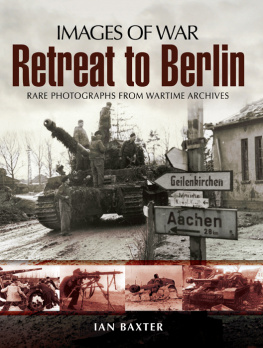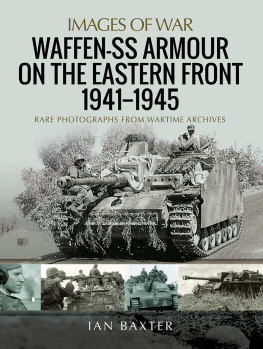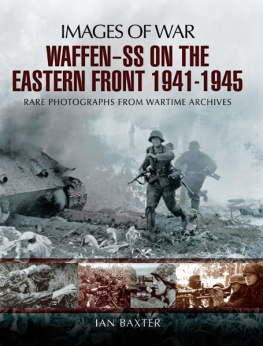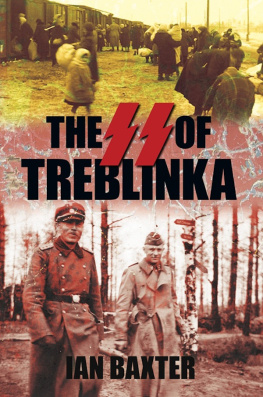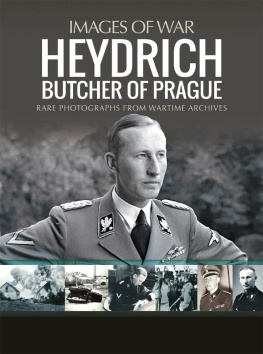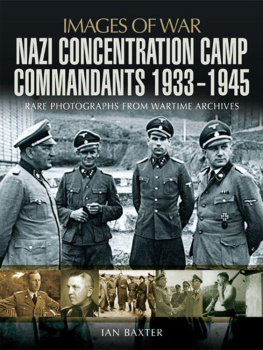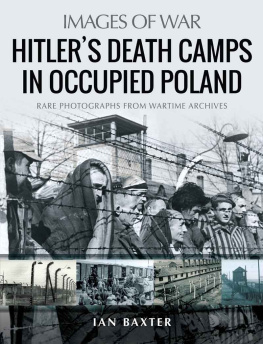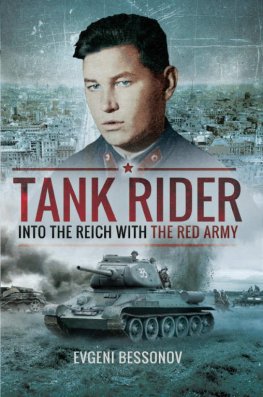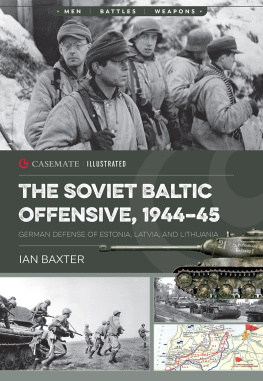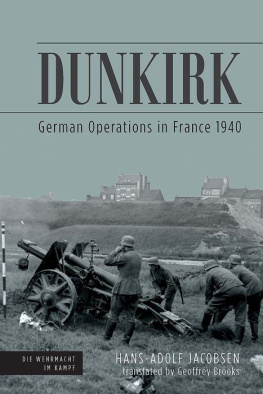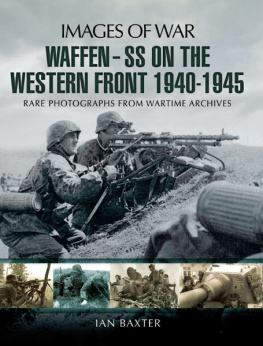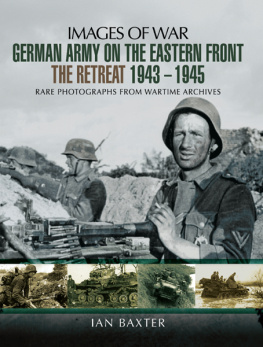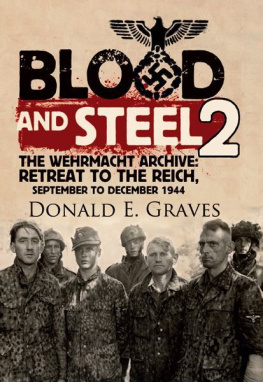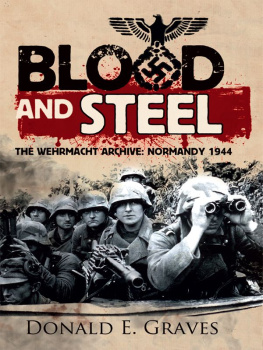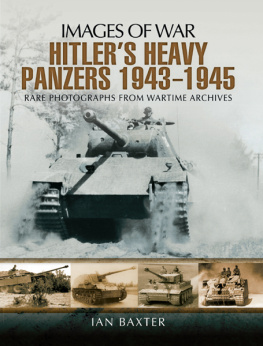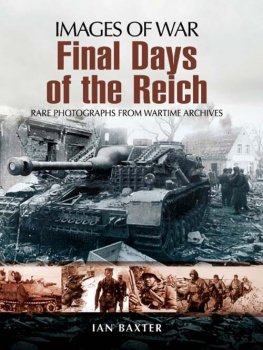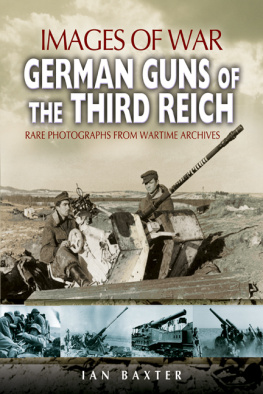
First published in Great Britain in 2011 by
PEN & SWORD MILITARY
an imprint of
Pen & Sword Books Ltd,
47 Church Street, Barnsley,
South Yorkshire.
S70 2AS
Copyright Ian Baxter 2011
ISBN 978-1-84884-380-6
The right of Ian Baxter to be identified as Author of
this Work has been asserted by him in accordance with the
Copyright, Designs and Patents Act 1988.
A CIP catalogue record for this book is available
from the British Library
All rights reserved. No part of this book may be reproduced or transmitted in any form or by any means, electronic or mechanical including photocopying, recording or by any information storage and retrieval system, without permission from the Publisher in writing.
Typeset by Mac Style, Beverley, East Yorkshire
Printed and bound in Great Britain by CPI
Pen & Sword Books Ltd incorporates the imprints of
Pen & Sword Books Ltd incorporates the Imprints of Pen & Sword Aviation, Pen & Sword Family History, Pen & Sword Maritime, Pen & Sword Military, Pen & Sword Discovery, Wharncliffe Local History, Wharncliffe True Crime, Wharncliffe Transport, Pen & Sword Select, Pen & Sword Military Classics, Leo Cooper, The Praetorian Press, Remember When, Seaforth Publishing and Frontline Publishing
For a complete list of Pen & Sword titles please contact:
PEN & SWORD BOOKS LIMITED
47 Church Street, Barnsley, South Yorkshire, S70 2AS, England.
E-mail:
Website: www.pen-and-sword.co.uk
Contents
Introduction
Drawing on a superb collection of rare and unpublished photographs this latest book in the popular Images of War Series provides an absorbing insight into the last desperate year of the German Army. In dramatic detail it analyses the German retreat from the wastelands of the Eastern and Western Fronts into a bombed and devastated Third Reich to the very gates of Berlin. Accompanied by in-depth captions and text, the book shows how Army, Waffen-SS, Luftwaffe, Hitlerjugend, and Volkssturm personnel try and defend every yard of ground from the overwhelming enemy. As the final months of the war are played out the reader will learn how the Germans fought to the grim death in a drastic attempt to prevent what Hitler called the two-fold devastation of the Reich. Despite the adverse situation in which the German Army was placed, soldiers continued right to the very end, holding their lines under the constant hammer blows of ground and air bombardments. Those German forces that were fortunate enough to survive the overwhelming ferocity of the enemy onslaught, gradually streamed back where they were compelled to fight on home soil until they were either destroyed and its remnants encircled, or were driven around a devastated Berlin.
Assessment of the German Soldier mid-late 1944
The last six months of 1944 for the German soldier on the Eastern Front were very gloomy. They had fought desperately to maintain cohesion and hold their meager positions that often saw thousands perish. By the summer of 1944 the German forces were holding a battle line more than 1,400 miles in overall length, which had been severely weakened by the overwhelming strength of the Red Army. To make matters worse during the first half of 1944 troop units were no longer being refitted with replacements to compensate for the large losses sustained. Supplies of equipment and ammunition too were so insufficient in some areas of the front that commanders were compelled to issue their men with rations. As a consequence many soldiers had become increasingly aware that they were in the final stages of the war in the East, and this included battle-hardened combatants. They had also realized that they were now fighting an enemy that was far superior to them. As a consequence in a number of sectors of the front soldiers were able to realistically access the war situation and this in turn managed to save the lives of many that would of normally been killed fighting to the last man.
In spite the adverse situation in which the German soldier was placed during their retreat in 1944, he was still strong and determined to fight with courage and skill. However, by the summer of 1944 the German soldier had expended considerable combat efforts lacking sufficient reconnaissance and the necessary support of tanks and heavy weapons to ensure any type of success. The Red Army had constantly outgunned them, and the Luftwaffe air support was almost non-existent. The short summer nights too had caused considerable problems for the men, for they only had a few hours of darkness in which to conceal their night marches and construction of field fortifications. Consequently, the front line soldier in the forward combat area was already continuously under fire from Russian artillery and aircraft. Ultimately, the German soldier in the summer of 1944 was ill prepared against any type of large-scale offensive. The infantry defensive positions relied upon sufficient infantry ammunition supply and the necessary support to ensure that they would able to hold their fortified areas. Without this, the German soldier was doomed. Commanders in the field were fully aware of the significant problems and the difficulties imposed by committing badly equipped soldiers to defend the depleted lines of defence. However, in the end, they had no other choice than to order their troops to fight with whatever they had at their disposal. Their commanders were resolute in trying to hold back their hated Red foe in order to prevent them from reaching the borders of the Reich, and then on to Berlin.
Chapter 1
Defensive Battles in the East
In spite the success of the Russian 1944 summer offensive code-named Operation Bagration which saw the complete collapse of Army Group Centre, the Red Army were still unable to break the dogged determination and resilience of the German soldier. However, they were dwarfed by Russian superiority and they could do nothing to alleviate the overall predicament that was increasingly festering itself along the entire battered and worn Eastern Front. What followed during the last weeks of July was a frantic attempt by the Germans to stem the rout of the Soviet drive into Poland. Army Group North Ukraine tried its best to contain its slender position on the River Bug, whilst remnants of Army Group Centre tied with all available resources to create a solid front line Kaunas-Bialystok-Brest and assemble what was left of its forces on both its flanks. But between Army Group Centre and Army Group North German positions were depleted. The mauled 3rd Panzer Army had been fighting continuously in the area and even managed to capture and secure a number of villages in the area. In late July it captured Schaulen and then advanced on Mitau. The 3rd Panzer Army ordered the 7th Panzer Division to press on further and attack the Soviet 6th Guards Tanks Army in the area south of Kovno. The operation was very risky, but the Panzerwaffe once again demonstrated their effectiveness on the battlefield. The 3rd Panzer Army desperately tried to hold Kovno, fearing that loosing this Russian province would ensure the collapse of the Baltic States. On 31 July the Red Army pushed forward using their newly won freedom of manoeuvre in the direction of the East Prussian border. Meanwhile the 6th Panzer Division block the route towards Griskabudis, whilst Panzergrenadier von Werthen blocked the south bank of the Memel near Zapyskis. A few days later the Red Army unleashed a considerable number of tanks either side of Nova where the 6th Panzer Division was operating. What followed was the battle of Kovno.
Next page
